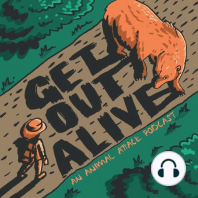49 min listen

Ep. 50: An Invisible Polar Bear, a Shark Taste-Test, and Other Recent Stories
Ep. 50: An Invisible Polar Bear, a Shark Taste-Test, and Other Recent Stories
ratings:
Length:
57 minutes
Released:
Apr 12, 2023
Format:
Podcast episode
Description
Our Patrons voted, and this week we're talking about recent animal attacks in the news.Support our Earth Day clean-up by buying one of our new "Don't Litter...Or Else!" Shirts, designed by Smeesh!First Animal Attack Covered: A polar bear attack in Wales, Alaska (and for those curious, the majority of people there are Inupiaq)Second Animal Attack Covered: A blacktip shark bite in Hobe Sound, FloridaThird Animal Attack Covered: An alligator attack in Fort Pierce, FloridaFourth Animal Attack Covered: A monkey attack in OklahomaFinal Animal Attack Covered: A man nearly had his arm ripped off by his pet zebraSupport the showSupport the show by shopping at www.getoutalivepodcast.com/shopFollow us on Instagram, Facebook, Tiktok, check out our website GetOutAlivePodcast.com and join us on Patreon!You can find Ashley @TheAngryOlogist on Twitter
Released:
Apr 12, 2023
Format:
Podcast episode
Titles in the series (79)
Ep. 8: Stuck in a Hippo's mouth (feat. Camille Fritsch) by Get Out Alive: An Animal Attack Podcast